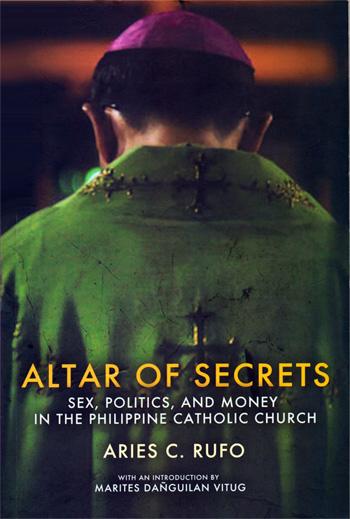|
| The Ph Catholic Church's Best-Kept Secrets
By Ira Pedrasa
ABS-CBN
June 17, 2013
http://www.abs-cbnnews.com/focus/06/17/13/ph-catholic-churchs-best-kept-secrets
MANILA - Stories of priests having sexual affairs and siring children are no longer new in the Philippines. But where are these reports most common?
According to the “Altar of Secrets: Sex, Politics, and Money in the Philippine Catholic Church”, author and award-winning journalist Aries Rufo said: “Despite their vow of celibacy, or maybe because of it, priests having affairs or siring children is not a new phenomenon in the Philippines. In some dioceses, the problem has become the norm rather than the exception, particularly in Pampanga.”
Citing sources, Rufo said almost one-third of Pampanga’s more than 100 priests had or have illicit relationships.
Instead of shunning the priests and giving them the boot, however, the community there appears to have given them the support, with the number of church-goers even rising to hear them deliver their homilies.
“Kapampangans are known for their deep religiosity, loving and spoiling their priests to a fault,” Rufo said. He interviewed several lay leaders who said the supposed misdeeds of priests are downplayed just because “we look up to our religious leaders.”
He cited, for example, the case of Father Crispin Cadiang who later asked to be discharged from his priestly duties after admitting to siring two children. Cadiang then said he was surprised “when people hearing mass increased in my parish…The people’s show of support was very encouraging.”
There’s also the case of Ed Panlilio, who first made headlines when he challenged the big named politicians in Pampanga. Asked by members of the Jesus is Lord Movement prior to his gubernatorial bid in 2007 if he had affairs with women and fathered a child or two, Panlilio only said: “I have had my mistakes. Who does not?”
Wrong signal
Rufo, citing an interview with Archbishop Emeritus Oscar Cruz, said the nonchalance of Kapampangans may be giving a wrong signal to priests.
“This hands-off culture, prevalent in Pampanga, only prodded other priests to violate their celibacy vow. It was like a virus that surreptitiously infected others,” he said.
If there were those who raised hell, they were only in the minority, Rufo said.
Such was the case of a layman who filed a complaint against Father Jeffrey Maghirang of the Metropolitan Cathedral San Fernando in October 2011. The layman accused Maghirang of having an affair with his wife.
San Fernando, Pampanga Bishop Paciano Aniceto got wind of the complaint, but downplayed the situation like all other cases there, Rufo said. The case was later dismissed for lack of evidence.
“[To the] complainant, it did not matter anymore. When we visited him a few months after his case was junked, he said he was in the process of moving on. This meant separating from his wife, having custody of their child and vowing to keep track of Maghirang’s movements,” the book says.
Skeletons in the closet
The book exposes many more secrets of the Catholic Church, which remains mum on the reports.
There’s the story of the protégés of the late Manila Cardinal Jaime Sin – Bishop Teodoro Bacani and Bishop Crisostomo Yalung – who left their duties after being embroiled in scandals. The latter, after supposedly having an affair with a young woman and allegedly using the church’s coffers to care for their child, is now in Sacramento, California.
“Within the Church, two factions emerged: one pushed to sweep the scandal under the rug while another group argued the Church should come clean. Those who favored secrecy won,” Rufo said.
There’s also the case of Malolos Bishop Cirilo Almario who was allegedly involved in the “carnal corruption of several young seminarians…[Almario] and several priests were reportedly involved.”
It was the then Papal Nuncio who ordered Almario’s removal from the post.
Still, “the secrecy and the confidentiality somehow worked. Long time priests in Malolos we talked to said they were not aware of the scandal. Current Malolos Bishop Jose Oliveros…also said he was not aware of the incident. It was as if it never happened,” Rufo said.
In his book, Rufo tried to answer the issue of secrecy in the church.
Shame
He said there is a guideline in handling sexual abuses and scandals, but this is just paper tiger – imposing but ineffective. “The Church law says that the Congregation for the Doctrine of the Faith may, at its own discretion, conduct an inquiry itself or guide the bishop on how to proceed with the case,” he said.
What about the victims?
The book says the stigma of shame, coupled with the influence of the church lording over the laity, almost always leads to the incident being swept under the rug.
“Most of the victims do not feel pain or violence during the moment of abuse. It is at a much later time, when one understands fully the harmful effects, that one begins to talk. When the abuser is from the clergy or religious, the culture tends to remain silent because accusing a religious person imbued culturally with holiness and divine authority can disturb the peace of society.”
|
